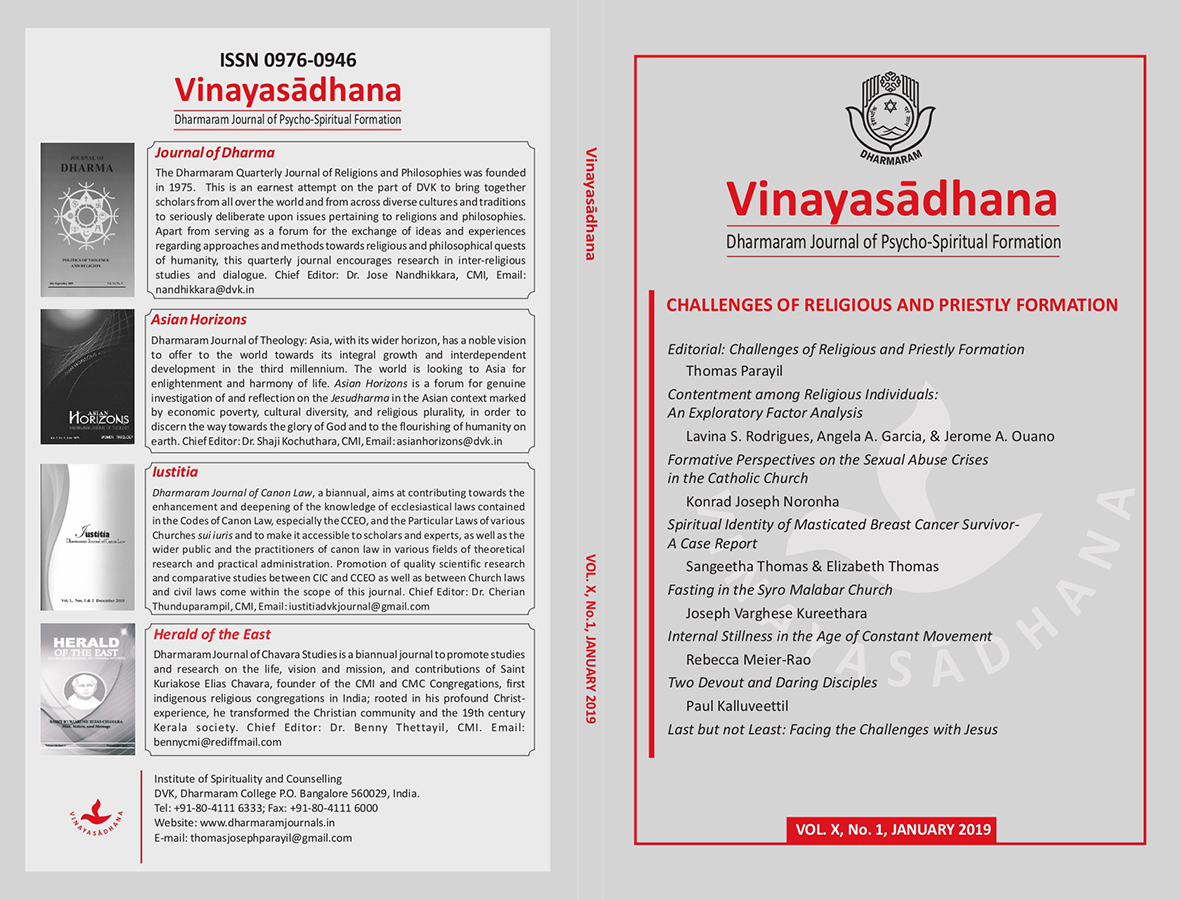Contentment among Religious Individuals
An Exploratory Factor Analysis
Keywords:
Components of Contentment, Exploratory Factor Analysis, Religious ContentmentAbstract
This study aimed to explore the experience of contentment among religious priests and nuns. An exploratory factor analysis (EFA) was conducted on the responses of 358 religious individuals on a 100-item questionnaire, developed from interviews conducted with 29 religious individuals on how they experience contentment in their lives. Results suggest that a four-factor structure– characterized by pursuing purpose, accepting and actualizing self, belonging in the community, and receiving affirmation from others– describe the experience and components of contentment among religious. Limitations of the study and suggestions for future directions are also discussed.
References
Carter, J. (2000). Verse 204 in the Dhammapada. New York: Oxford University Press.
Chittiser, J. (1995). The fire in these ashes- A spirituality of contemporary religious life. Kansas: Sheed & Ward - The National Catholic Reporter Publishing Company.
Cordaro, D. T., Brackett, M., Glass, L., & Anderson, C. L. (2016). Contentment: Perceived completeness across cultures and traditions. Review of General Psychology, 20(3), 221-235.
Csikszentmihalyi, M., & Hunter, J. (2003). Happiness in everyday life: The uses of experience sampling. Journal of Happiness Studies, 4 (2), 185-199.
Emmons, R. A., & McCullough, M. E. (2004). The psychology of gratitude. New York, NY: Oxford University Press.
Fabrigar, L. R., Wegener, D. T., MacCallum, R. C., & Strahan, E. J. (1999). Evaluating the use of exploratory factor analysis in psychological research. Psychological Methods, 4(3), 272.
Fernandes, A. (2012). Freedom of the reborn. Mangalore: Ryshivana.
Greene, R. R. (2002). Resiliency: An integrated approach to practice, policy and research. Washington DC: NASW Press.
Lu, L., & Shih, J. B. (2014). Sources of happiness: A qualitative approach. Journal of Social Psychology, 137(2), 181-187.
Patanjali. (1990). Patanjali Yoga Sutras. Madras, India: Ramakrishna Vedanta Center Publlishing.
Francis. (2014). Apostolic letter to all Consecrated People on the occasion of the year of consecrated life. Rome: Vatican press.
John Paul II (2002). Letter of Pope John Paul II to Religious. Pauline Publishing House.
Rulla, L. M. (1989). Anthropology of Christian Vocation. Rome: Gregorian University Press.
Ryff, C. (1989). Happiness is everything or is it? Explorations on the meaning of psychological well-being. Journal of Personality and Social Psychology, 1069-1081.
Seligman, M. (2010). Flourish: Positive psychology and positive interventions. The University of Michigan, pp. 231- 243.
Seligman, M. E. & Csikszentmihalyi, M. (2000). Positive psychology: An introduction. American Psychologist, 55 (1), 5-14.
Sharma, S. (1996). Applied multivariate techniques. New York: John Wiley & Sons.
Strong J. (1995). New Strong’s exhaustive concordance of the Bible. Nashville, TN: Thomas Nelson Publishing.
Wiese, H. (2011). Moderation, contentment, work, and alms – A Buddhist household theory. The University of Leipzig, Leipzig, Germany.


